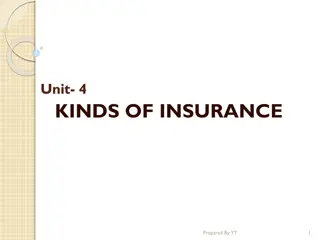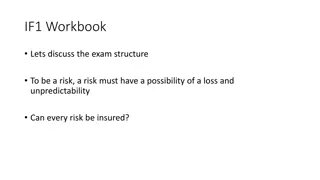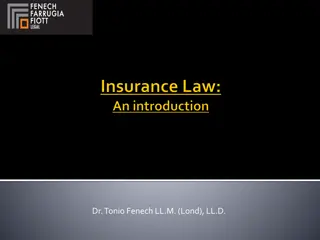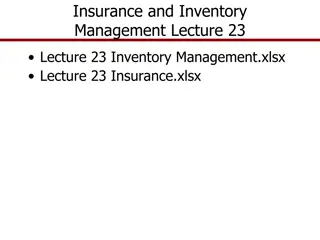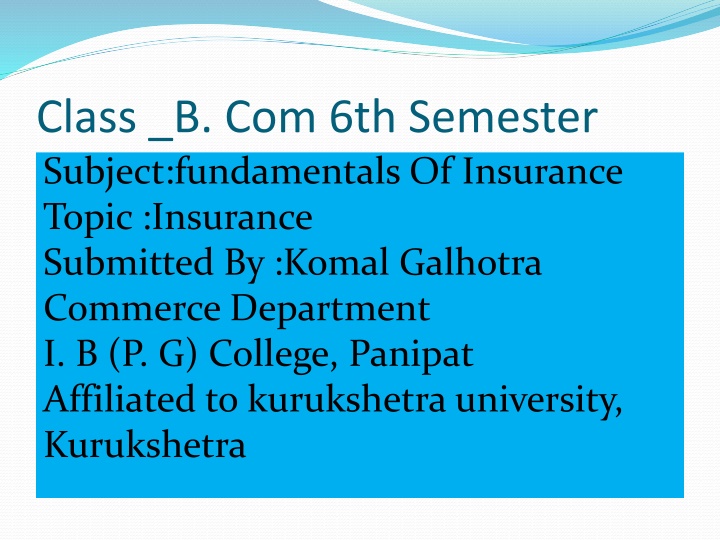
Fundamentals of Insurance: Meaning, Features, and Principles
Understand the fundamentals of insurance, including its meaning as a risk transfer mechanism, key features like risk transfer and cooperative nature, and principles such as insurable interest and utmost good faith. Insurance is not charity but a service based on consideration. Explore the roles of the insurer and insured, the concept of premium, and essential principles like contribution and subrogation.
Download Presentation

Please find below an Image/Link to download the presentation.
The content on the website is provided AS IS for your information and personal use only. It may not be sold, licensed, or shared on other websites without obtaining consent from the author. If you encounter any issues during the download, it is possible that the publisher has removed the file from their server.
You are allowed to download the files provided on this website for personal or commercial use, subject to the condition that they are used lawfully. All files are the property of their respective owners.
The content on the website is provided AS IS for your information and personal use only. It may not be sold, licensed, or shared on other websites without obtaining consent from the author.
E N D
Presentation Transcript
Class _B. Com 6th Semester Subject:fundamentals Of Insurance Topic :Insurance Submitted By :Komal Galhotra Commerce Department I. B (P. G) College, Panipat Affiliated to kurukshetra university, Kurukshetra
Meaning of Insurance It is a risk transfer mechanism and it is a means of protection from the financial loss. There are two parties : Insurer (company who indemnify the person) Insured(person who is idemnified) The insurer charges some fees for such indemnification in a certain period of time, that fees is called premium. In simple words, it is a system under which insured pay some money as a premium to the insurer for the future contingency.
Features of Insurance : Transfer of Risk :Insurance is a risk transfer mechanism in which the insured person transfer his risk on the insurer. Co_operative Device :Insurance is a co_operative form in which the loss of a person is shared by all the persons who have taken the insurance. Insurance is a Service :Insurance is a service because nothing is actually produced and there is no tangible item being exchanged.
Insurance is not a Charity :Consideration is the main point of difference between charity and insurance .Charity is given without consideration but insurance is provided in cosideration of premium. Premium :The person Who is going to be insured has to pay an amount for the coverage of an unforeseen risk, that amount is known as Premium :The person is Who is going to be insured has to pay an amount for the coverage of anunforseenrisk,thatamount is known as premium. Premium.
Principles of Insurance : Principle of insurable interest: Insurable interest just means that the subject matter of the contract must provide financial gain by existing for the insured (or policy holder) and would lead to financial loss if damaged, destroyed, stolen or lost.
Principle of Utmost Good Faith :It means all the material facts must be disclosed by both the parties. A contract will be voidable if the concealment done by one of the party. It means all the material facts must be disclosed by both the parties .A contract will be voidable if the concealment done by any one of the party. 3:Principle of Contribution: an insurer to pursue a third party that caused an insurance loss to the insured. Principle of Subrogation :In this one person takes over the rights or remedies of a creditor against his debtor .It is the right of This principle specifies that when a person buys insurance from multiple companies and risk arises then insured can claim the compensation from the insurers proportionately or from one insurer .
Principle of Indemnity : It states that insurer agrees to pay no more than the actual amount of loss .The main objective of the principle is to maintain the same financial position that existed before the loss or damage .It has two purposes : To reduce moral hazard To prevent the insured from profiting from a loss .
This principle mean nearest cause .it means if the loss is caused by more than one peril or cause ,the nearest cause should be taken into consideration to decide the liability if the loss may not happened without the remote cause .
As per this principle ,the insured must take all the steps to minimise the loss in event of mishap. He should not remain inactive even if his property is insured.
Types of Insurance : Life Insurance Non _life Insurance
Life Insurance : It is a contract between the insurance company and insured person .The amount is repaid to the insured under contract in case of : Maturity Date Specified dates at periodic intervals On the date of death,if it occurs earlier. Life insurance is useful for all including individuals ,business,etc.
Non Life Insurance or General Insurance Insurance other than life insurance falls under the category of general insurance .General Insurance include : Motor Insurance Fire Insurance Marine Insurance Engineering Insurance












